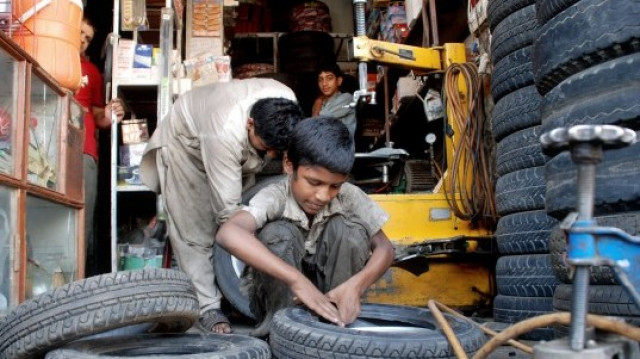Millions pushed into child labour in Pakistan
Rising poverty forces more children to work. Long-term psychological impact on youngsters.

He is one of millions of children driven into labour by poverty in a country where the government is seen as too corrupt and ineffective to care for its citizens, even the young and helpless.
"I want to study and become a doctor but we don't have any money," said Mukhtar, who helps his family make ends meet.
Rising food and fuel prices and a struggling economy have forced many families to send their children to search for work instead of to the classroom.
Frequent political crises in Pakistan means the nation's leaders are unlikely to end child labour, or a host of other problems from a Taliban insurgency to power cuts, any time soon.
"From the bottom of my heart, I want to send my son to school but we have so many expenses... We struggle to put food on our table", said Mukhtar's mother, Shazia, who also has a four-year-old son and a two-year-old daughter.
Her husband, Mohammed, a street barber, earns only Rs7,500 a month, not enough to support the family.
"He's learning to work and he also earns around Rs300-400. So what's wrong in that. We are poor," Mohammed said of the boy.
Pakistan needs to take immediate measures to stabilise growing budget pressures and to raise interest rates to contain rising inflation, the International Monetary Fund warned on Monday.
Economic pressures are forcing young Pakistanis, like teenager Noor Shah and his three brothers, to leave home in search of work.
They now live in a tiny room above a grimy tea shop where they toil all day in Karachi.
"I have so many dishes to wash. When I get tired the men serving tea become very angry with me. They swear and shout," said Shah, who is from Balochistan.
Others, like 11-year-old labourer Kashif, are subjected to harsher treatment.
"If he makes a mistake I'll hit him," said his 19-year-old supervisor, Tanveer Shehzad, who said he had endured the same hardship as a child labourer.
Government needs to do more
Up to 10 million children are estimated to be working in Pakistan, says Mannan Rana, child and adolescent protection specialist at the United Nations Children's Fund (UNICEF).
The latest government figures, showing three million child labourers, date back to 1996, underscoring how scant attention has been paid to documenting the problem, which is likely to get worse given the makeup of the fast-growing population.
The plight of child labourers in Pakistan came under international scrutiny when it was discovered that children were hand-stitching soccer balls in the town of Sialkot.
Foreign sports equipment companies are wary of any hint of association with child exploitation. One stopped orders in 2006 from a Pakistan-based supplier of hand-stitched soccer balls, saying the factory had failed to correct labour compliance violations.
But the outcry hasn't helped much.
"The problem is that the whole industry has moved into private homes, which has made it a bit difficult to monitor if child labour is being used," said Hussain Naqi, the national co-ordinator of the Human Rights Commission of Pakistan.
"This is not just an issue in Sialkot, child labour is occurring all across Pakistan in very dangerous sectors like glass bangle manufacturing, cleaning of oil tankers, poultry farms, motor workshops, brick kilns and small hotels."
On Monday, the collapse of a three-storey factory in the city of Lahore after a gas explosion highlighted dangers faced by child labourers.
"I was inside the building when the blast happened. Two other boys were with me and they started running," said eight-year-old Asad, a labourer in the veterinary product facility.
"I don't know where they went or if they are alive."
His sobbing mother said crushing poverty had left her no choice but to send her son to work in such conditions.
Pakistan spends less than 2% of its gross domestic product on education, which translates into a lack of skills amongst the younger population, pushing them onto the street in search of work.
By comparison, just over 17% of 2011-12 state spending went to defence, though some experts put the figure at 26%.
"The problem is there and we are not in a state of denial," said Shahnaz Wazir Ali, social sector special assistant to the prime minister, adding that about 45% of Pakistan's population of almost 180 million is below the age of 22.
But Pakistan's leaders are often too consumed by infighting, or tension with the military, to address child welfare.
In recent months, Pakistan has been gripped by rumours of a possible military coup and the ongoing tussle between the Supreme Court and the government is preoccupying the leadership.
With little government protection, children keep falling into the same vicious circle of exploitation.
"It is all very damaging for a child's psychology," said Salma Jafar, executive director at Social Innovations, a human rights advocacy group.
“Once you are abused, you grow up with that abuse."
Twelve-year-old Mohammed Naeem, the eldest of three orphans, ran away from his first boss. He could not take the verbal and physical abuse.
But his new work, scraping rust all day for 25 rupees at a mechanics shop to feed his sisters, is still gruelling.
"I don't see any other life for myself. What can I do. I'm helpless. The government is doing nothing for us," said the boy, wearing soiled clothing and open, oversized sandals.
"All I ask of them is to assist me in my helpless state. To take it away."



















COMMENTS
Comments are moderated and generally will be posted if they are on-topic and not abusive.
For more information, please see our Comments FAQ